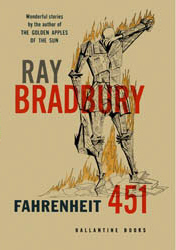
Laura's Blog

Happy Birthday Fahrenheit 451!
October 4, 2017

In October 1953 Ray Bradbury published his groundbreaking dystopian world of censorship and book-burning—right at the height of McCarthy’s power and influence on American thought. It couldn’t have been more timely. Two of the senator’s co-crusaders had just traveled to American embassies to remove from our overseas State Department libraries any books they labeled “subversive” and “un-American.” They even burned some. (See my Sept. 24 post for more: https://lmelliott.com/lauras-blog/knocked-over-feather-mccarthy-and-book-burning ) People across the nation followed their lead and had their own literary bonfires, tossing in works by writers such as John Steinbeck (his focus on the plight of workers decried as “proletariat”).
Bradbury was already under surveillance by the FBI because of his membership in the Screen Writers’ Guild, his vocal opposition to the congressional persecution of the Hollywood Ten, and his science fiction work, The Martian Chronicles, published in 1950. (Science fiction and post-apocalyptic narratives were thought fertile ground for writers to seed Communist ideology.) And yet—although Fahrenheit 451’s themes and plot serve as a palpable protest to McCarthy’s attacks on American freedom of thought—Bradbury has claimed that was not his initial intent.
Instead, the author points to the influence of previous world events he had witnessed as a child: the rise of fascism, Hitler, and Nazi-book burning. Bradbury was an avid patron of public libraries growing up. He devoured books by Hugo, Dumas, Dostoyevsky, H. G. Wells, Jules Verne, and Edgar Allan Poe—and it’s easy to spot similar creative sensibilities woven into the dark, oppressive world of Fahrenheit 451.
But it is not, Bradbury said, a novel about state suppression. He was more motivated by his fears that the new medium, television—what he dismissed as an opiate—would turn Americans “into morons” by destroying interest in literature, which in turn would spread intellectual atrophy and a banal pack-mentality. (Too bad he did not live to see today’s vast and comprehensive offerings!)
I can’t help thinking his warning about the “bombardment of factoids” dulling our ability to think for ourselves was as prophetic as Fahrenheit 451 was.

Other Blog Posts
Click Here to See All of Laura's Blog Posts
